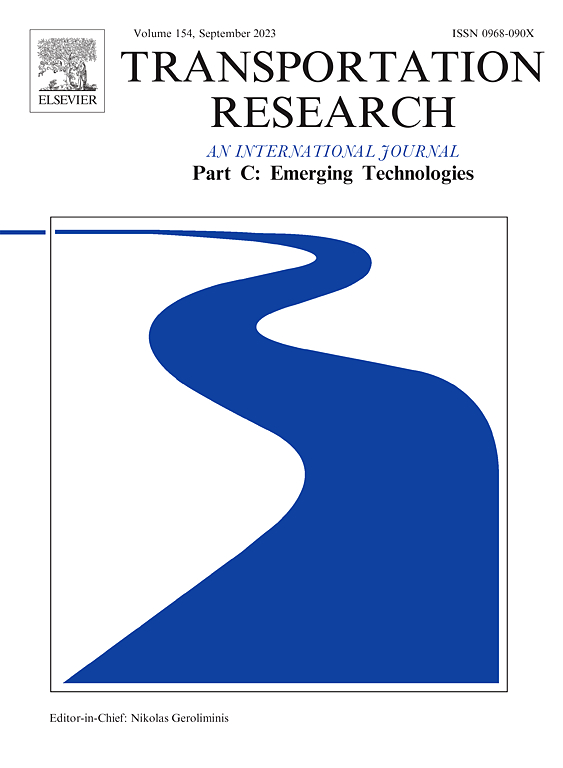A computational graph-based model and a back-propagation solution algorithm for a networked train rescheduling problem
IF 7.6
1区 工程技术
Q1 TRANSPORTATION SCIENCE & TECHNOLOGY
Transportation Research Part C-Emerging Technologies
Pub Date : 2025-09-10
DOI:10.1016/j.trc.2025.105323
引用次数: 0
Abstract
Real-time train rescheduling is of more significant requirements on both the computation time and solution performance compared to offline scheduling. The motivation for this study is to develop an efficient and effective method to reschedule disrupted trains in the context of severe disruptions, e.g., a four-hour segment blockage. A novel computational graph (CG)-based model is proposed to provide a continuous representation of the problem, wherein the discrete “if-then” decision-making process is transformed into continuous numerical computations that can be efficiently addressed. A customized back-propagation (BP) algorithm is developed to refine the solutions through an iterative process that includes a forward calculation of the objective function and a backward derivation of the decision variables. Owing to these computationally efficient processes, our proposed methodology can effectively handle the increasing complexity arising from detailed mesoscopic-level formulations in large-scale instances. We conduct experiments on both a small hypothetical network and the real-world Chinese high-speed railway network to validate the effectiveness and efficiency of our method. We also perform experimental analysis to examine the appropriate parameter settings for improved system performance.
网络列车重调度问题的计算图模型及反向传播求解算法
与离线调度相比,实时列车重调度对计算时间和求解性能都有更高的要求。本研究的动机是开发一种高效和有效的方法,在严重中断的情况下重新安排中断的列车,例如,四小时的路段堵塞。提出了一种新的基于计算图(CG)的模型来提供问题的连续表示,其中离散的“if-then”决策过程转化为可以有效解决的连续数值计算。开发了一种定制的反向传播(BP)算法,通过迭代过程来改进解决方案,该过程包括目标函数的前向计算和决策变量的后向推导。由于这些计算效率高的过程,我们提出的方法可以有效地处理大规模实例中详细的介观水平公式所产生的日益增加的复杂性。我们在一个小型的假设网络和真实的中国高速铁路网上进行了实验,以验证我们方法的有效性和效率。我们还进行了实验分析,以检查适当的参数设置,以提高系统性能。
本文章由计算机程序翻译,如有差异,请以英文原文为准。
求助全文
约1分钟内获得全文
求助全文
来源期刊
CiteScore
15.80
自引率
12.00%
发文量
332
审稿时长
64 days
期刊介绍:
Transportation Research: Part C (TR_C) is dedicated to showcasing high-quality, scholarly research that delves into the development, applications, and implications of transportation systems and emerging technologies. Our focus lies not solely on individual technologies, but rather on their broader implications for the planning, design, operation, control, maintenance, and rehabilitation of transportation systems, services, and components. In essence, the intellectual core of the journal revolves around the transportation aspect rather than the technology itself. We actively encourage the integration of quantitative methods from diverse fields such as operations research, control systems, complex networks, computer science, and artificial intelligence. Join us in exploring the intersection of transportation systems and emerging technologies to drive innovation and progress in the field.

 求助内容:
求助内容: 应助结果提醒方式:
应助结果提醒方式:


